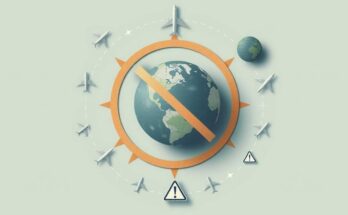The DRC’s Foreign Minister accused Rwanda of illegal occupation amidst M23 advances in eastern Congo. The capture of Goma has heightened fears of violence and humanitarian crises, leading to international calls for ceasefire and peacekeeping measures. The situation has resulted in considerable unrest, with significant casualties among peacekeeping forces.
On January 31, the Foreign Minister of the Democratic Republic of the Congo (DRC), Therese Kayikwamba Wagner, accused Rwanda of illegally occupying parts of DRC territory amid escalating tensions due to the M23 rebel group’s current advances in eastern Congo. Wagner stated her belief that Rwanda seeks to instigate a regime change in the DRC, as international leaders have not held President Paul Kagame accountable for alleged violations of international law.
The M23 group has primarily concentrated its military operations in South Kivu, a province that borders Rwanda and Burundi to the east. Despite the accusations, the Rwandan government has consistently denied any involvement with M23, emphasizing that its military presence aims to contain the spread of violence rather than pursue territorial ambitions. Rwandan Government Spokesperson Yolande Makolo stated, “We’re not interested in war, we’re not interested in annexation, we’re not interested in regime change.”
The capture of Goma, North Kivu’s capital with nearly two million residents, has raised concerns about impending violence and food shortages among the population. The situation has resulted in tens of thousands losing access to water and electricity, with an estimated 178,000 Congolese displaced from their homes due to the ongoing conflict. Further allegations suggest that M23 has been exploiting the region’s rich mineral resources, raising serious ethical and legal concerns, which have been echoed by various United Nations reports.
U.N. Secretary-General Antonio Guterres has warned that the M23 advances could trigger a regional conflict, urging an immediate ceasefire and withdrawal from occupied territories. The United States has echoed this call, with Secretary of State Marco Rubio labeling the situation as “deeply troubling” after discussions with President Kagame. Additionally, the Southern African Development Community convened to address the growing security crisis in eastern DRC, having previously deployed peacekeeping forces to the area amid escalating violence.
In recent skirmishes, South African President Cyril Ramaphosa confirmed the deaths of 13 soldiers, emphasizing the actions of both the M23 and Rwandan forces contributing to the unrest. The situation remains perilous, with multiple nations involved in peacekeeping efforts suffering losses in their commitment to restoring peace in the DRC.
The ongoing conflict in the eastern Democratic Republic of the Congo has roots in historical tensions involving various rebel groups, particularly the M23, which has alleged ties to Rwanda. The strategic location of DRC, rich in minerals, has attracted both local and international interests, further complicating the conflict dynamics. International bodies, including the United Nations, have repeatedly called for peace and accountability, highlighting the dire humanitarian situation resulting from the violence.
The DRC’s accusation against Rwanda regarding military interference highlights the complexity of the eastern Congo conflict, driven by both local and regional actors. The humanitarian crisis resulting from the M23 offensive necessitates immediate international attention and action to prevent further escalation and loss of life. The calls for a ceasefire and accountability are critical steps toward addressing these ongoing issues and stabilizing the region.
Original Source: www.upi.com




